
Future-proofing your EU funding strategy for the post-2027 period
Preparing for EU funding for the post-2027 period? Learn what organisations can do now to align with policy shifts, build partnerships and strengthen readiness.
Without funding from external sources, be it EU funding or other sources of funding, many important projects with a positive impact on society would not happen. This is in particular true for the social, non-profit sector where usually no direct financial profit from the project can be expected for the participating organisations. Implementing an EU project has various advantages, the most prevailing one being the funding which will enable the consortium to carry out their project. But, there are many more benefits when participating in an EU project, let’s look at 7 other benefits beyond the funding itself.
It is a common view that applying for EU grants is difficult, even more so if you have never written an EU grant application before. However, with a structured approach, good preparation and with a certain level of motivation, you may be surprised how much is achievable. In my view one important ingredient for success is to have the goal in mind. This is of course primarily the project you will be able to implement and how much the project will benefit the targeted beneficiaries of the action, sometimes even beyond the end of the project. What is often not thought of when writing a project proposal is that there are many more benefits beyond the funding itself. Let’s take a look at what else could be awaiting you.
When you work with organisations from other EU countries (or, depending on the particular conditions of the programme or Call you are applying for also countries beyond EU borders), it means that you have ample EU wide networking opportunities at your fingertips. During the implementation of your project, you are learning from each other, complementing each other and achieve more together than what you would have had accomplished on your own.
Participating in an EU project allows some insights on best practices how your partner organisations do things. For example, if your project deals with the integration of migrants, you could be exploring which support measures are the most effective in relation to the individuals, taking account of their particular place of origin, their culture, or specific needs of women, men, girls or boys. If you are usually working (mostly) on your own, it can be helpful to look at this together with other organisations who have made their own experiences already, with good or not so good results. And then develop a better strategy together within the project, or for your own organisation beyond the actual scope of the project.
As a coordinator of a project, and also to a non-negligible extent as a participant organisation, you will have interactions with the European Commission and/or the Executive Agencies in charge of monitoring your project. Sometimes, there can be direct interactions when you are organising project events which include their participation. And in any case, during the application process and the periodic reporting you will be learning about their ways of working, their expectations and what needs to be included in the different sections of the application forms and later in the implementation reports, or how to ensure effective communication and dissemination activities for your project.
This experience will make you, the persons involved in the project, more competent in various aspects. Once you have been managing or participating in an EU project, you can use the skills for the next application and project – it will all get easier!
When working with organisations and people from different EU countries as it is the case in an EU project, one very pleasant side effect can be that you broaden your cultural horizons. It’s so enriching to work with people from different nationalities and backgrounds! It can be pleasant, surprising and eye-opening to look beyond prevailing stereotypes. You may be the host to organize a project meeting and be travelling to interesting places for other meetings.
During project meetings the host is often eager to introduce the guests to their local culture, culinary and cultural traditions. Often, a project visit to show you their “usual” way of working is also being organised. If you are lucky, the host also arranges a (short) guided city tour and often a dinner in a restaurant with the “typical” local food…
Well, I don’t wish to give the impression that project meetings are only for fun, one should not forget that there is a reason for the meeting and a lot of time and effort involved for preparing. Plus, the travel and socializing dinners often take place in addition to the usual working hours. But all in all, there are experiences to be made that you don’t get that easily otherwise, so it’s definitely worth the extra time investment.
The standard language for EU project is English. Needless to say, staff working on EU projects already need to have a sufficient working level of English. Often, English cannot be used in everyday work, so working in an EU project can be an excellent opportunity to brush up your English to be more fluent and accurate. Practice makes perfect 🙂
Depending on the countries involved, an EU project can be a chance as well to practice other languages than English that someone has studied or practiced previously, or to maybe learn a completely new language from scratch. Very useful not only for personal development, but maybe even for future professional purposes.
For the duration of the project, which mostly run for a couple of years (depending on the nature of the project) a certain number of staff contracts can be secured. It could be for example 3 full time staff equivalents or maybe a fraction (e.g. 0.5 or less per involved staff member) who could have a safe job for let’s say 3 years.
At this point, just a quick side remark to clarify that it is not the purpose of an EU project to replace jobs that would have otherwise been financed from other sources. In principle, the jobs come in addition to what you as an organisation would otherwise work on. This means if core staff will be working on an EU project, you would have resources free to hire (temporary) replacements for getting the core work done. In practice, it’s often intertwined; staff are still doing part of their usual job and in addition, they work part-time for the EU project.
Let’s talk about public relations and visibility. Everyone talks about the good work they are doing and you should do so too. Your target beneficiaries need to know what you are doing for them, and on the other hand, potential donors need to know about your expertise and dedication as well.
Participating in an EU project is an excellent opportunity to put yourself a bit more in the spotlight. EU project participation already requires you to engage in communication and dissemination activities to make the project better known and to ensure it reaches the desired impact. For example, you can present the project on your website, post about it on social media and issue press releases when an important milestone has been achieved. In short, such measures certainly add to your perceived competence and reliability as a core actor in your field.
After the new project has been implemented, which has included many interactions with your European partners and promising project results, there is a chance that you have new ideas for new projects or activities. Be it a follow-up of your project regarding a specific question that should be further explored, or something that actually did not turn out as expected during project implementation and should be addressed differently, or simply because you learned about some best practices in other countries, you may have gained inspiration for future activities. And within your consortium, maybe there are even already known and trusted European partners to team up with.
Personally, I can confirm that participating in a EU project can be an impactful experience. Apart from having unforgettable memories from when I’ve been involved in European projects, I appreciate the multiple advantages, in particular the immense learning effects (both thematically and in terms of project administration), the transfer of knowledge between the project partners and the opportunity of cooperating with organisations from various countries and nationalities.
You certainly have to choose your partners wisely, but there is a high chance to encounter a productive atmosphere with open minded and eager-to-learn collaborators. And, last but not least, when combining forces for greater impact, the implementation of one project may be the starting point for many more meaningful endeavors in the future.
Have you been involved in EU projects already? Which experiences did you make that you wouldn’t want to have missed? Let me know below in the comments.
Are you unsure about whether your project idea meets the requirements for getting EU funding? Get this free checklist to find out.
—
Ready to take the next step? Discover the compact online course “Kickstart Your EU Funding Journey – Get Ready to Access EU Project Funding”

Author: Astrid Mechel
https://eufundingconsulting.eu
Hello, I am Astrid Mechel and I work (for the most part) with small and medium sized organisations who aim to access EU funding. It is my goal to help discovering suitable EU project funding possibilities and to provide support to submit a high-quality grant application. My main thematic focus is on grants for research and innovation, environmental sustainability as well as on social inclusion and participation.
Read more articles here:

Preparing for EU funding for the post-2027 period? Learn what organisations can do now to align with policy shifts, build partnerships and strengthen readiness.

EU project funding for nonprofits: Discover 6 misconceptions that hold organisations back and how to turn them into opportunities for growth and impact.

Applying for EU funding can be a complex and challenging. This article offers 12 practical tips to help you avoid the most common stumbling blocks.
Online Workshop
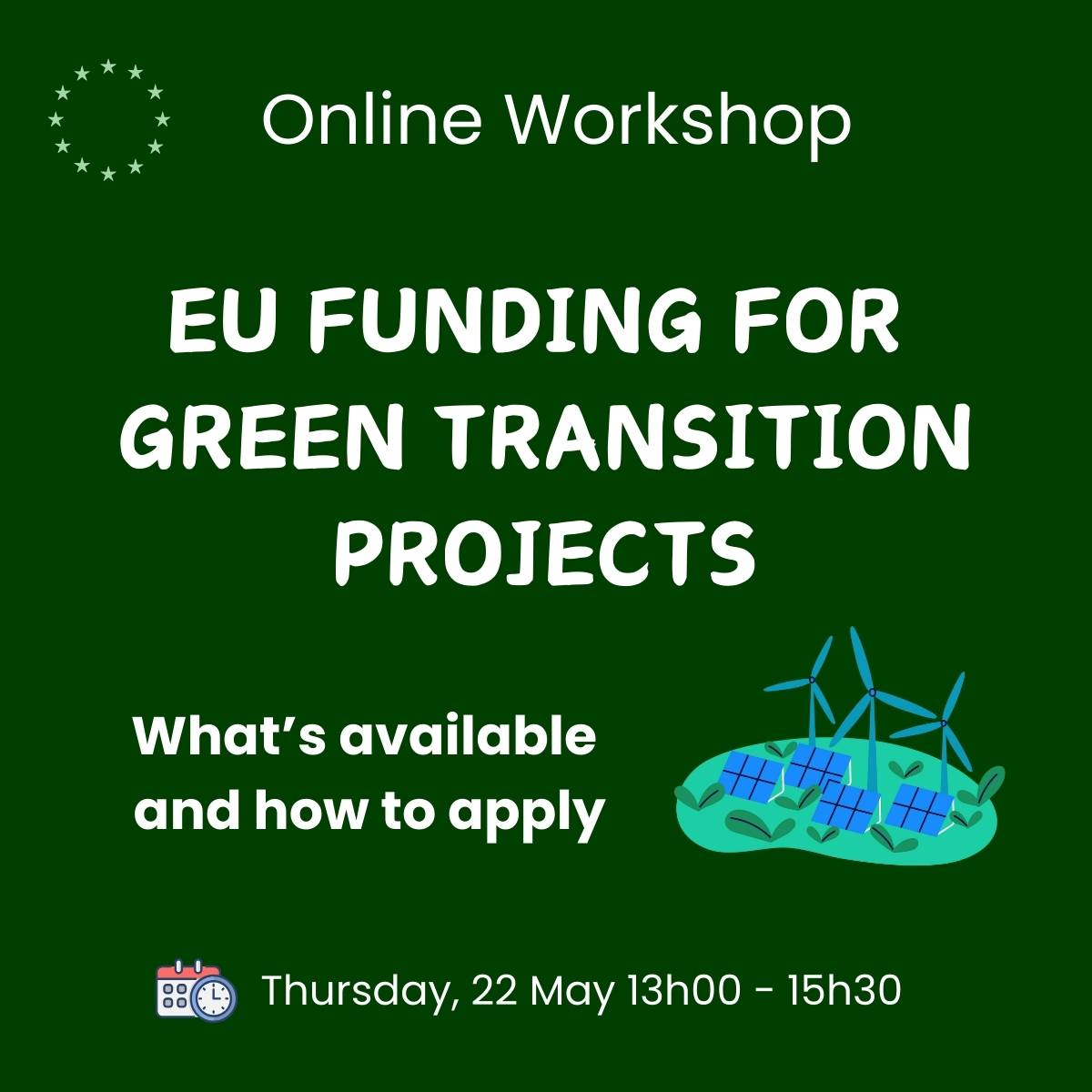
Interactive Live Workshop
On 22 May 2025 from 13h00-15h30
Registrations are closing soon
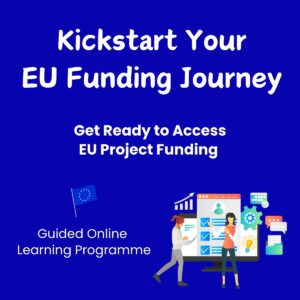
Curious about EU funding and how it could support your next project? Join the new live programme round for a compact and easy-to-follow way to get started with EU funding.
Key Terminologies – Application Guidance
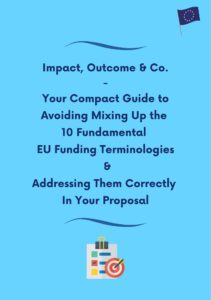
This guidance compares and compare and clarifies the 10 key terminologies within an EU funding application. How should you address them in your proposal, and what kind of information belongs to which one of them?
Online Workshop on 6 November!
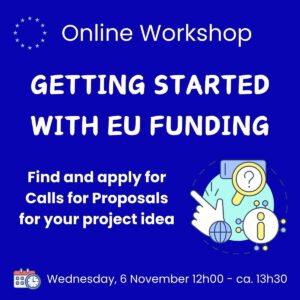
The workshop “Getting Started with EU Funding” is for participants with no or very limited experience in EU funding. Discover what kind of projects the EU is funding, the requirements and how you can apply for funding in your thematic field.
EU Funding Checklist
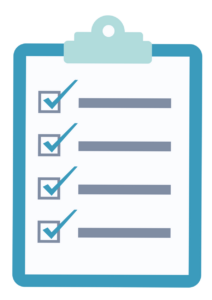
Do you have a new project idea and are wondering if EU funding could be available for your project?
This checklist will guide you through the most important questions to be considered when applying for EU project grants and includes some further suggestions how you could adapt your concept to be more in line with EU expectations regarding fundability.
Get the brand new upgraded guidance booklet (free offer):
Your compact guide on how they work and how your organisation can apply for funding
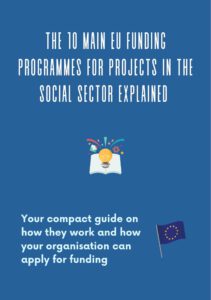
Find out which 10 EU programmes offer grants for projects in the social sector, what the conditions for funding are and how you can apply.
Online Workshop
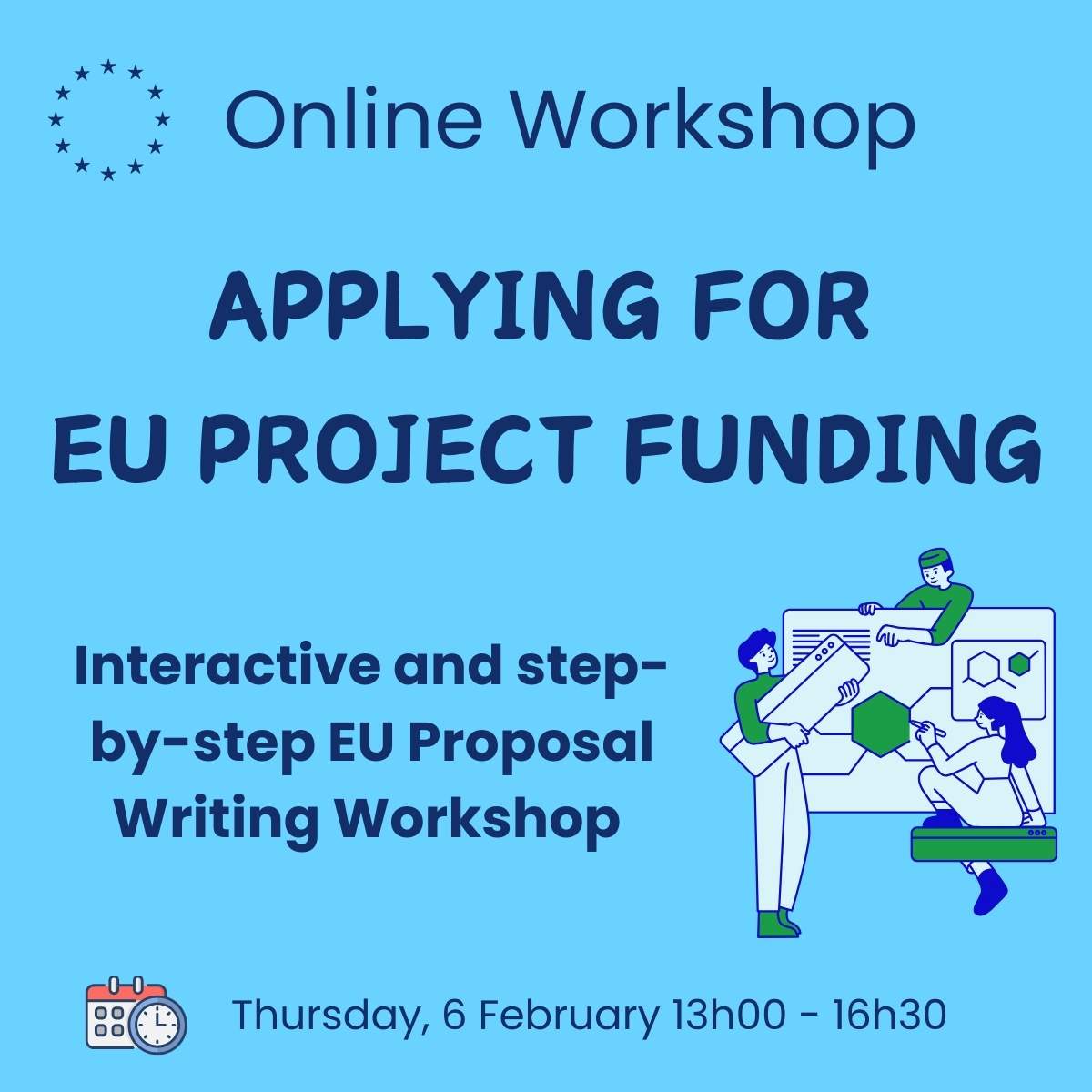
Interactive and step-by-step EU Proposal Writing Workshop
On 6 February 2025 from 13h00-16h30